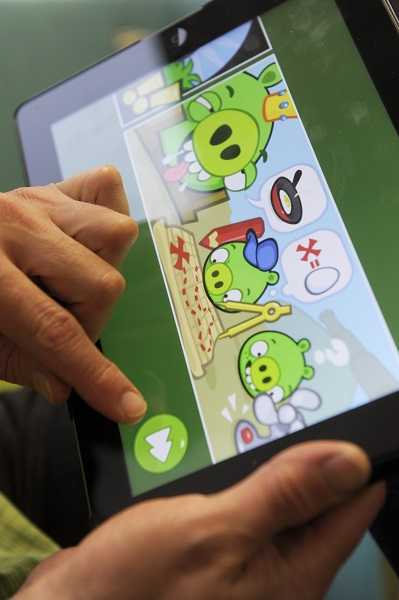|
Tue, 30 Dec, 2014 12:00:56 AM FTimes- Xinhua Report by Elina Xu, Dec. 30  Child is playing with Tablet. File Photo Lehtikuva Tomi got his smart phone as a birthday gift when he turned 7 years old. His mother Laura told Xinhua that "Tomi asked for a smart phone, because many of his friends have already got smart phones or tablets."
Access to internet is universal in Finland. The country's internet penetration rate is among the highest in the world. According to Statistic Finland, 92 percent of the population aged from 16 to 74 used the internet in 2013.
The trend is enhanced by the popularity of mobile internet. More and more small children own their smart phones. A survey conducted by DNA, Finland's third largest mobile operator in August 2013, showed that about 50 percent of first-grade pupils (7 to 8 years old) owned smart phones.
While the internet serves as a way to enrich knowledge, inappropriate content or online threats could seriously endanger the physical and mental health of minors, who are vulnerable to online waste such as pornography, violence and crime.
Cyber bullying is an emerging phenomenon around the world, particularly in countries with higher internet penetration rate.
A study made by University of Tampere, southern Finand, manifested that 11 percent of respondents aged 12 to 18 have been bullied online and 24 percent of them have witnessed their friends being cyber bullied.
Another study done by University of Oulu, northern Finland, even showed that 30 percent of 11-year-old children have often or sometimes suffered from bullying online.
Preventing children from cyber bullying has aroused increasing public concern in Finland.
The Finnish Centre for Media Education and Audiovisual Media (MEKU), affiliated to the Finnish ministry of education, is a governmental bureau responsible for promoting media education, children's media skills and the development of safe media environment for children.
MEKU has organized "Media Literacy Week" annually since 2013. Before that the week was known as "Safer Internet Week." Both the "Safer Internet Week" and "Media Literacy Week" have a common objective, which is to protect minors from harmful content and its negative effects.
The Finnish Ministry of Education instructed schools and public libraries nationwide to install web filtering software on their computer systems to block harmful websites.
Major Finnish telecommunication operators provide parents with "parental control" services, which can efficiently delete unhealthy online content when their children browse the internet.
Some anti-virus software sold in Finland has the function of "parental control."
"To protect my son from online hazards, I installed an anti-virus software to my son's smart phone, " said Laura. "It can block possible harmful websites."
Finland has started to set Virtual Community Policing Group (a group of internet police officers) in major cities since 2008, aiming to prevent online crimes and ensure internet safety. The internet police officers use social media as a tool to contact local people and prevent social media related offenses.
Just before the "Media Literacy Week" 2014 was held, in an online discussion arranged by Finnish Broadcasting Company YLE on Jan. 29, Jutta Antikainen, an internet police officer from Helsinki Police Department, provided guidelines to children and young people concerning "How to do if you suffer online bullying? "
Cyber bullying is of great concern also by Finnish child protection organizations. "Children are active media users and difficult situations are often caused by children's natural curiosity," said Juuso Peura, chief of youth work from the Mannerheim League for Child Welfare of Finland.
Both the police officer and child protection expert lay emphasis on the duty of parents.
According to Antikainen, when the online bully occurs, the first and the most important step is to make an open discussion between parents and their children about online stuff.
If the situation continues, children or parents have to contact internet police. "Reporting to police is the last option," emphasized Antikainen.
Parents' guidance and communication with their children regarding online content, were recognized by Peura, the most important means to reduce risks of cyber bullying.
Suvi Tuominen, project manager from MEKU, agreed. She added that it should be made clear to children that they must tell their parents as soon as possible in case they see anything suspicious online.
More News
|
|
Finland Times
| Thursday, 18 April, 2024 |

